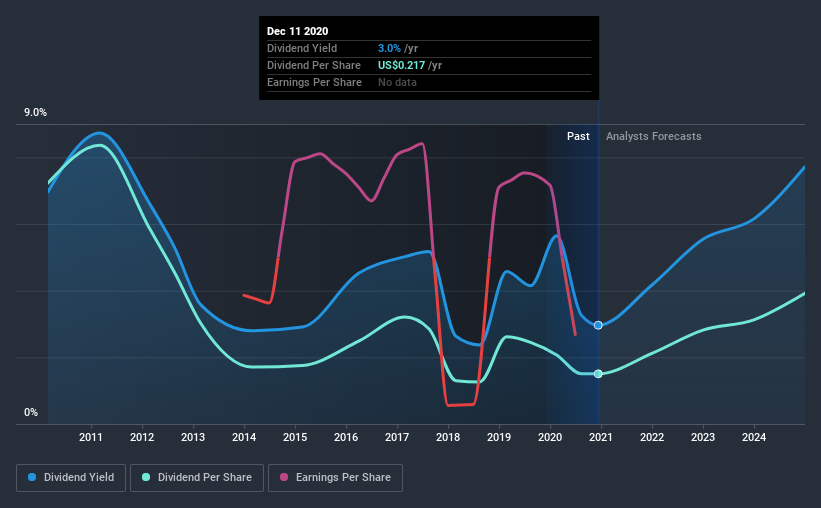Is QBE Insurance Group Limited (ASX:QBE) A Risky Dividend Stock?

Is QBE Insurance Group Limited (ASX:QBE) a good dividend stock? How can we tell? Dividend paying companies with growing earnings can be highly rewarding in the long term. Unfortunately, it's common for investors to be enticed in by the seemingly attractive yield, and lose money when the company has to cut its dividend payments.
While QBE Insurance Group's 3.0% dividend yield is not the highest, we think its lengthy payment history is quite interesting. Some simple analysis can reduce the risk of holding QBE Insurance Group for its dividend, and we'll focus on the most important aspects below.
Click the interactive chart for our full dividend analysis

Payout ratios
Companies (usually) pay dividends out of their earnings. If a company is paying more than it earns, the dividend might have to be cut. Comparing dividend payments to a company's net profit after tax is a simple way of reality-checking whether a dividend is sustainable. Although it reported a loss over the past 12 months, QBE Insurance Group currently pays a dividend. When a loss-making financial company pays a dividend, the dividend is not being paid out of profit, which is a concern if the company can't return to operating profitably.
We update our data on QBE Insurance Group every 24 hours, so you can always get our latest analysis of its financial health, here.
Dividend Volatility
From the perspective of an income investor who wants to earn dividends for many years, there is not much point buying a stock if its dividend is regularly cut or is not reliable. For the purpose of this article, we only scrutinise the last decade of QBE Insurance Group's dividend payments. The dividend has been cut on at least one occasion historically. During the past 10-year period, the first annual payment was US$1.0 in 2010, compared to US$0.2 last year. Dividend payments have fallen sharply, down 79% over that time.
When a company's per-share dividend falls we question if this reflects poorly on either external business conditions, or the company's capital allocation decisions. Either way, we find it hard to get excited about a company with a declining dividend.
Dividend Growth Potential
With a relatively unstable dividend, and a poor history of shrinking dividends, it's even more important to see if EPS are growing. Over the past five years, it looks as though QBE Insurance Group's EPS have declined at around 25% a year. With this kind of significant decline, we always wonder what has changed in the business. Dividends are about stability, and QBE Insurance Group's earnings per share, which support the dividend, have been anything but stable.
We'd also point out that QBE Insurance Group issued a meaningful number of new shares in the past year. Regularly issuing new shares can be detrimental - it's hard to grow dividends per share when new shares are regularly being created.
Conclusion
When we look at a dividend stock, we need to form a judgement on whether the dividend will grow, if the company is able to maintain it in a wide range of economic circumstances, and if the dividend payout is sustainable. First, it's not great to see a dividend being paid despite the company being unprofitable over the last year. Earnings per share have been falling, and the company has cut its dividend at least once in the past. From a dividend perspective, this is a cause for concern. Using these criteria, QBE Insurance Group looks suboptimal from a dividend investment perspective.
Companies possessing a stable dividend policy will likely enjoy greater investor interest than those suffering from a more inconsistent approach. At the same time, there are other factors our readers should be conscious of before pouring capital into a stock. For example, we've picked out 2 warning signs for QBE Insurance Group that investors should know about before committing capital to this stock.
Looking for more high-yielding dividend ideas? Try our curated list of dividend stocks with a yield above 3%.
If you’re looking to trade QBE Insurance Group, open an account with the lowest-cost* platform trusted by professionals, Interactive Brokers. Their clients from over 200 countries and territories trade stocks, options, futures, forex, bonds and funds worldwide from a single integrated account. Promoted
Valuation is complex, but we're here to simplify it.
Discover if QBE Insurance Group might be undervalued or overvalued with our detailed analysis, featuring fair value estimates, potential risks, dividends, insider trades, and its financial condition.
Access Free AnalysisThis article by Simply Wall St is general in nature. It does not constitute a recommendation to buy or sell any stock, and does not take account of your objectives, or your financial situation. We aim to bring you long-term focused analysis driven by fundamental data. Note that our analysis may not factor in the latest price-sensitive company announcements or qualitative material. Simply Wall St has no position in any stocks mentioned.
*Interactive Brokers Rated Lowest Cost Broker by StockBrokers.com Annual Online Review 2020
Have feedback on this article? Concerned about the content? Get in touch with us directly. Alternatively, email editorial-team@simplywallst.com.
About ASX:QBE
QBE Insurance Group
Engages in underwriting general insurance and reinsurance risks in the Australia Pacific, North America, and internationally.
Undervalued with solid track record and pays a dividend.


